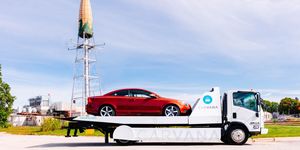- An IBM survey of 14,000 people has found that people plan to use personal transportation more, while using public transit and ride-sharing services less, in the post-pandemic environment.
- Yet many reported an inability or unwillingness to buy a car right now due to the economic environment.
- Commuting will also take a hit; a vast majority of respondents said that they wanted to work from home more often once their offices reopened.
Just how different the post-coronavirus world will look is open to speculation—but survey data from IBM’s Institute for Business Value gives a glimpse into how people will utilize transportation, both public and private, once the world reopens.
Overall, the survey showed, people are reconsidering the ways that they used to get around. Public transportation, ride-sharing services, and personal transportation are all things that people reported that they were going to approach differently. IBM surveyed 14,000 people (for the automotive portion of the survey) in April, and more than 17 percent said that they intend to use their personal vehicle more often due to COVID-19.
Of those who regularly used public transit such as buses, subways, or trains before the pandemic, 20 percent said that they no longer will do so, and another 28 percent said they will use it less frequently. When it comes to ride sharing, a majority of the respondents said they would use the services less often or stop using them completely.
Some have speculated that car buying will become more attractive as a way to socially isolate, as opposed to taking public transportation. “Bars, restaurants, hotels, concerts, sporting events, and beach resorts all face a more protracted path back to normality if social distancing remains the norm,” Chris Bryant wrote in Bloomberg Opinion. “That’s bound to encourage getting behind the wheel of a car, where physical distancing is sort of the point.”
Nonetheless, as Bryant also notes and the study suggests, the pandemic will leave many people unwilling or unable to buy a car. The survey found that more than quarter of respondents said lack of confidence in the economic outlook will have an impact on their decision to buy a vehicle. A similar number of people said they were going to hold off on buying a car for at least six months.
On top of that, the respondents added that incentives from manufacturers wouldn’t change their minds. Across the industry, automakers are offering attractive incentives on new vehicles such as zero percent financing on six-year loans with payment deferrals for as long as four months in an attempt to keep auto sales from falling dramatically.
Even if more people are driving to socially isolate themselves, increased interest in continuing to work from home could lessen the number of people commuting each day; 75 percent of people in the survey said that now they are working from home, they’d like to continue to do so at least occasionally. Over half said they want remotely working to be how they work from now on.
Source: Motor - aranddriver.com






